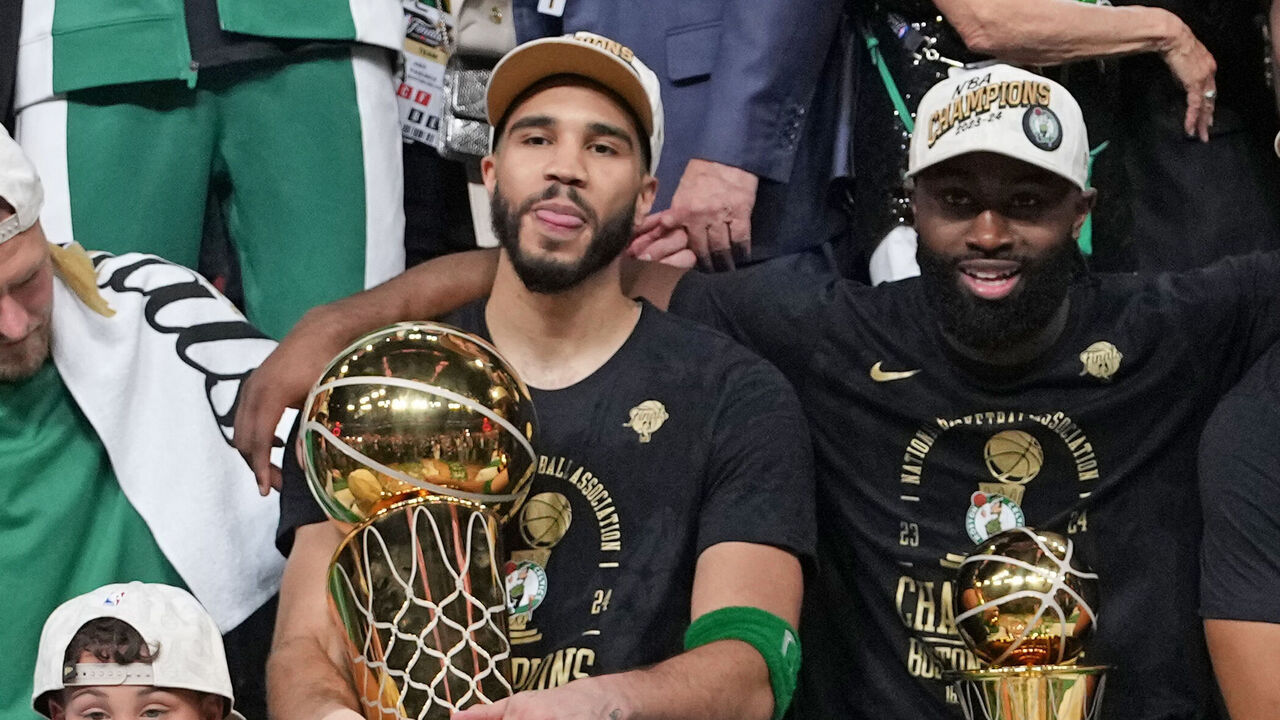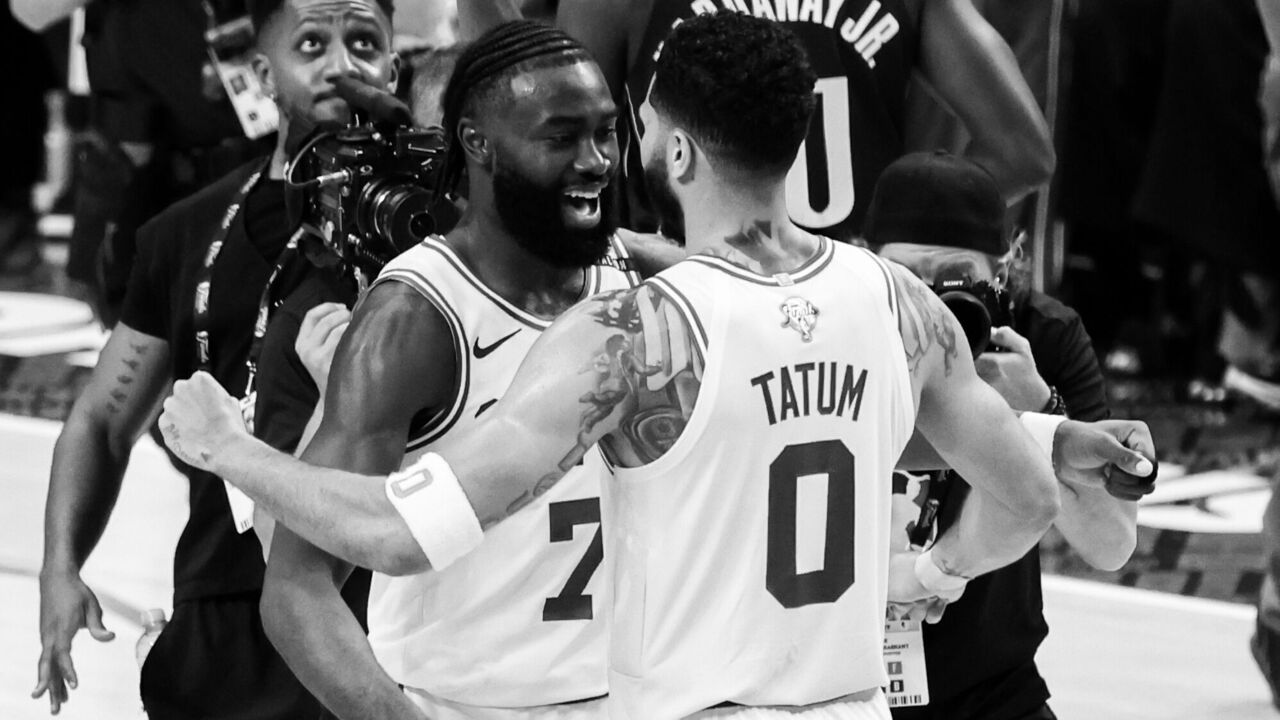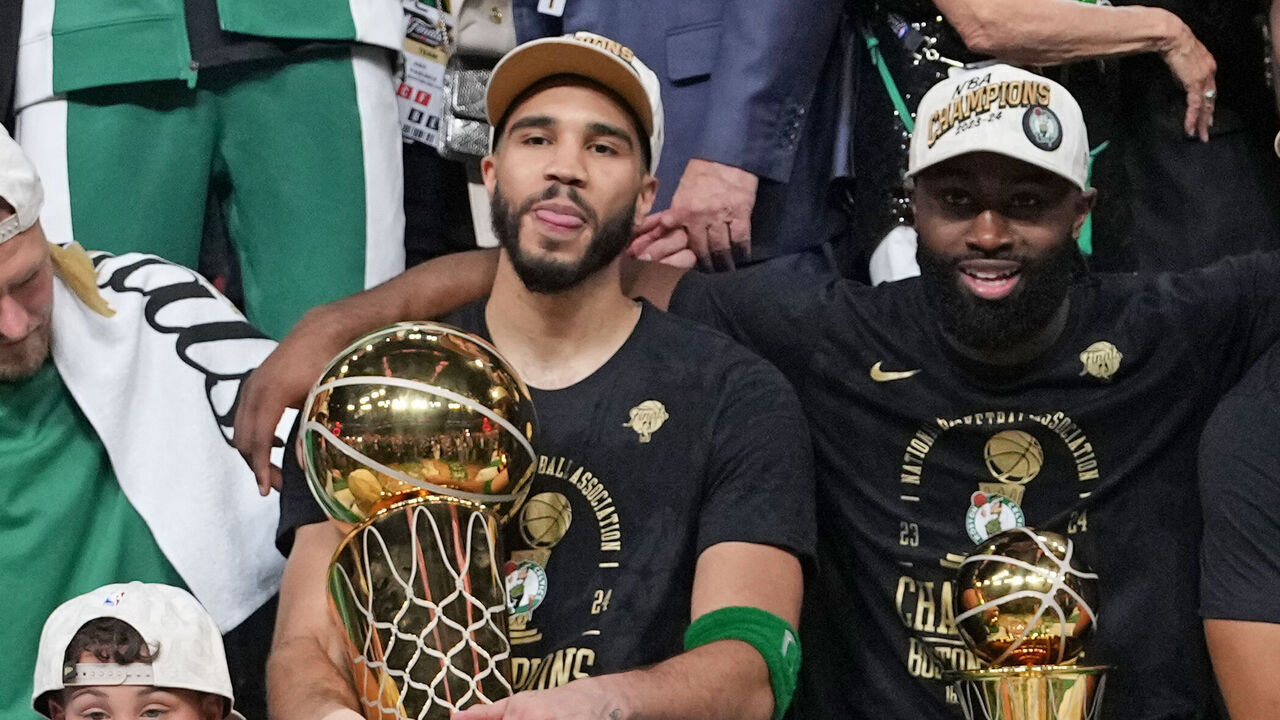For Tatum and Brown, championship culminates years of steady growth
The Boston Celtics’ 2024 championship, clinched emphatically with a 106-88 victory over the Dallas Mavericks in Game 5 of the Finals on Monday, is a testament to exceptional team-building, and to a perfectly harmonized collective.
It’s rare for a team to win a title without a consensus top-five player, and while Jayson Tatum is at the very least rubbing elbows with that kind of company, the Celtics’ great strength was their depth of high-end talent and the way it all fit so snugly together. Not since the 2014 Spurs has a group reached the top of the mountain with this type of roster balance and synergy. At the same time, this championship is also a testament to Boston’s two best players – Tatum and longtime running mate Jaylen Brown – and to the strides they both made en route to this career-altering achievement.
It’s been seven years since the Celtics put together what would prove to be their championship dual-wing battery, taking Brown and Tatum third overall in back-to-back drafts using the bounty of draft assets the Brooklyn Nets generously plopped into Danny Ainge’s lap. If it feels like the two of them have faced an undue amount of pressure and scrutiny since then, that’s probably because it’s extremely rare for players their age to have spent as much time under the microscope as they have.
The Celtics have been championship contenders basically from the moment Tatum entered the league in 2017, the year after Brown debuted for a 53-win conference finalist. Boston came up a win short of the Finals in Tatum’s rookie season, despite Kyrie Irving and Gordon Hayward – the team’s big-ticket offseason additions – being shelved for its entire playoff run. Tatum and Brown, at 20 and 21 years old, led the Celtics in scoring that postseason.

Over the next six years, the team went back to the East finals another four times and the Finals twice, culminating in this year’s ring. The roster changed dramatically around the Tatum-Brown nucleus in that time; Al Horford’s the only other player from that 2017-18 team who’s still in Boston, and he took a two-year detour through Philadelphia and Oklahoma City before coming back. Irving came and went, with just nine playoff games to show for his ballyhooed stint. Hayward broke his leg five minutes into his Celtics tenure and was never the same again.
Kemba Walker was brought in to be the Irving replacement, and he even played like it for half a season before falling off a cliff. Marcus Smart was embedded in the team’s cultural and stylistic fabric, until he wasn’t. Through it all, the Celtics have won and won and won, with Tatum and Brown the only constants. They’ve won more regular-season games than any other team, and are tied with the Warriors for the most playoff series wins since Brown was drafted.
The road to this stage wasn’t always smooth. Both of them, and the Celtics by extension, had to take plenty of playoff lumps. There were countless times, including in all the series Boston won, when the offense disappeared in a fog of no-pass possessions and sidestep threes; times when the pair’s playmaking limitations were exposed, and when it felt like the redundancies in their skill sets were becoming problematic.
The Celtics were a play-in team that got blasted out of the first round by Irving’s Nets in 2021. They lost their grip on the 2022 Finals amid a slew of ugly Tatum and Brown turnovers against a predatory Warriors defense. The Heat, with their physicality and focus and painstaking game-planning, were a thorn in the Celtics’ side, upsetting them twice as the lower seed in the East finals. That included stymieing Boston as an 8-seed last year, going up 3-0 and then holding on to win the series after the Celtics came back to level it.
Tatum sprained his ankle in the opening minutes of Game 7, and Brown – who shot 14% from 3-point range and had more turnovers than assists in the series – couldn’t pick up the slack. He’s talked about how the disappointment of that loss fueled him this season, which he capped by claiming MVP honors in both the conference finals and the Finals.
Last summer, on the heels of an All-NBA campaign, Brown was eligible for a supermax extension that would pay him close to $300 million over five years and temporarily make him the league’s most handsomely compensated player. With new second-apron penalties set to take effect, there were plenty of people who felt the Celtics should look to move him rather than give him that max, citing his narrow playmaking vision, shaky left hand, and occasionally spacy off-ball defense.
It was the latest in a long line of crossroads at which it seemed possible that Boston would ship him elsewhere. But just as they’d declined at every other turn to trade him for the available shiny object du jour – be it Anthony Davis, Kawhi Leonard, Jimmy Butler, or Kevin Durant – the Celtics committed to Brown, and had their faith rewarded in a huge way.
Tatum had his own postseason blemishes on his resume, but he also had his share of triumphs, like the 46-point Game 6 masterpiece he put together in Milwaukee to stave off elimination in 2022, or the record-setting 51 he dropped in Game 7 to eliminate the Sixers last year. He can now add a dominant championship clincher to his ledger, one in which he poured in 31 points, snagged eight rebounds, and dished out 11 assists while carving up the Mavericks’ defense with an array of slithering drives.
Plenty of the Celtics’ long-standing offensive issues cropped up during this run, even as they ripped through the playoffs with a 16-3 record. It’s just that they were so good, especially on defense, that those issues didn’t wind up mattering. And Tatum and Brown were of course huge components of that dominant defense. One of the biggest advantages Boston has over its opponents is that its best offensive players are also excellent defensive players. At every stage of this postseason, the two of them ruthlessly hunted mismatches, while their opponents found no such soft spots to attack.

Tatum and Brown have also smoothed out some of their skill-set ovelap by evolving over the years to fit the contours of one another’s games, as well as those of the complementary pieces Boston’s front office (now helmed by Brad Stevens, who graduated from coaching the team in 2021) put around them. Stevens completed the puzzle masterfully, pulling off genius trades for Derrick White, Kristaps Porzingis, and Jrue Holiday to form a starting five with essentially no holes. But it only worked as well as it did because of the core tandem’s steady growth, which filled in the spaces where gaps might have existed.
Tatum became a headier and more proactive playmaker, which helped overcome the fact that the team lacked an elite individual passer. He streamlined his decision-making as a self-creator, striking a much better balance between pulling up for threes and driving to the rim. Brown, while still susceptible to the odd backdoor cut, made significant strides as an off-ball defender, on top of continuing to improve as a ball-handler and creator for others. In the Finals against Dallas, the two of them did the most relentless driving of their careers.
Though their like-sizedness continues to make it difficult to use them together in two-man actions because it’s an automatic switch for the defense, they’ve found plenty of other ways to complement one another. Each has developed a keen sense of when and how to relocate or cut when the other has the ball. They occasionally interact in multi-screener split actions, and they frequently set each other up in transition. Their connection reached a new level in the playoffs, when Tatum assisted Brown on 31 baskets, after doing so just 43 times throughout the regular season.
The Celtics sang as a unit because of the sacrifices both guys were willing to make to serve the whole. Holiday and White, for example, benefited not only from being guarded by opponents’ third- and fourth-best defenders, but from the willingness and acuity with which Tatum and Brown screened for them on and off the ball, which preyed on opponents’ reluctance to switch those weaker defenders onto Boston’s two stars.
At the other end, Boston’s unique defensive scheme wouldn’t have worked throughout the playoffs if Tatum hadn’t been willing or able to be their primary defender of opposing centers, jockeying in the post and battling on the boards while being prepared to switch onto the opponent’s primary ball-handler at any moment. It wouldn’t have worked without Brown’s dogged on-ball work, which included grinding down Luka Doncic with 94 feet of pressure in the Finals.
In the end, the Celtics and their two stars answered every question as convicingly as they could under the circumstances. They dodged Butler in their first-round tilt with Miami this year, but it’s hard to imagine them being seriously threatened in that series even if he’d been healthy. You could say the same thing about the Cavaliers and their slew of injuries (including to Donovan Mitchell) in the second round, or the Pacers if Tyrese Haliburton hadn’t gone down in the conference finals, or the Bucks had Giannis Antetokounmpo been able to suit up for the playoffs, or the Knicks if they could’ve sustained an ambulent seven-man rotation.
Boston was so much better than all of those teams this season that those barely even feel like what-ifs, especially considering that the Celtics themselves were without their starting center for all but seven playoff games. Every season’s champion benefits from luck. And sure, given the breadth of misfortune that befell the rest of the East, it’s fair to say Boston benefited more than the average championship team. But so what? The 18th banner that’ll hang in TD Garden won’t look any different for it.
Eventually, all anyone will remember is that Tatum and Brown led the franchise to that elusive record-setting title, capping a season and playoff run that saw the Celtics go 80-21 with a double-digit average scoring margin. By any objective measure, that’s one of the great seasons in NBA history. And it cements Tatum and Brown as one of the most successful duos of the 21st century, with the two of them just now entering their primes.
Joe Wolfond writes about the NBA for theScore


